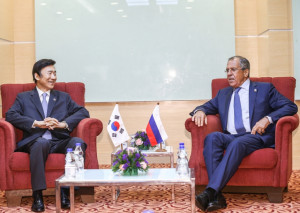O
In South Korea, mass media wrote more about the fact that the parties had agreed to pursue the full implementation of the UN Security Council resolution calling for sanctions against Pyongyang, and reaffirmed their commitment to the denuclearization of the Korean Peninsula, stressing that Kazakhstan and Russia would not accept the self-proclaimed Pyongyang’s nuclear status.
They also discussed issues on strengthening bilateral economic and political cooperation, as well as regional and international issues. The parties came to an agreement to look for practical ways to strengthen economic cooperation in the Far East and Siberia, and Yun Byung-se announced his commitment to begin actively participating in the East Economic Forum which will take place in Vladivostok in September this year. The foreign ministers of both countries also discussed the possibility of the visit by the President of South Korea Park Geun-hye to Moscow before the end of this year.
Supporters of the DPRK immediately presented the results of this visit as a confirmation of the fact that Russia has once again betrayed its faithful ally, North Korea. Some commentators were outraged that the visit by the South Korean foreign minister took place on Russian national holidays. However, if you look at the final documents closely, the following will catch your attention.
First, beyond a formal rhetoric nothing anti-North Korean was ever told. North Korea’s nuclear status has been called “self-proclaimed
Actually, even South Korean media were forced to mention the fact that “consent was not achieved by all items. Russia, like China, has agreed to impose sanctions against Pyongyang, but is opposed to imposing maximum pressure». As Lavrov said, Russia considers the transformation of the region into a regular confrontational bridgehead as unacceptable.”
This is perhaps the main point. Meanwhile, there is an opinion that Russia’s push for such action was in fact one of the main purposes for which the South Korean Foreign Minister came to Moscow. It is no secret that in recent years South Korean diplomacy is bending over backwards in order to convince the international community to “cease to be friends with the North.” For that, Seoul is ready to spend quite considerable amounts of money for investment projects in third-world countries, as long as these countries agree to stop all cooperation with North Korea. The most striking example of such policy is Park Geun-hye’s recent visit to a number of countries in Africa, where similar South Korean policy has recently almost led to a diplomatic scandal, during which it became clear that in some moments of shedding light on the results of the visit, South Korean media took to wishful thinking.
Second, there were no important agreements on the meeting results made. Memorandums of Understanding (with phrases like “discussed the possibilities”, “agreed to look for ways to”, etc.) remain simply as memorandums of understanding. However, ambitious and long-term economic projects can be seen, for example, within the agreements such as the one signed four years ago on the construction of a gas pipeline from Russia to South Korea. If anyone does not remember, it should have been built and completed by the year 2017, but it is not the Russian side that played the decisive role in the collapse of the project.
Third, we can note that, in general, the main news on the visit has not yet been confirmed. Nothing was said in the final documents or speeches about President Park Geun-hye’s upcoming visit to Russia. Only regular, general discussions on possibilities.
At the same time, amid talk of a “strategic partnership”, “development of political dialogue” between the two countries, attention should be drawn to the fact that South Korean Foreign Minister in general came to Russia for the first time in five years. As for the meetings of the presidents, they, in fact, were mostly sporadic and took place on the sidelines of international forums (at the 2013 G20 Saint Petersburg summit, at the 2014 G20 Brisbane summit, at the 2015 United Nations Climate Change Conference in Paris, etc.).
Konstantin Asmolov, Ph.D. in History, Chief Research Fellow at the Center for Korean Studies of the Institute of Far Eastern Studies of the Russian Academy of Sciences, exclusively for the online magazine “New Eastern Outlook”
